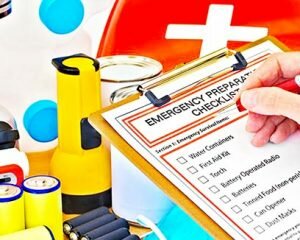Know How to Survive a Natural Disaster
 Weakley County Emergency Management Agency Director Ray Wiggington proclaimed September as National Preparedness Month and discusses how to survive a disaster.
Weakley County Emergency Management Agency Director Ray Wiggington proclaimed September as National Preparedness Month and discusses how to survive a disaster.BY DAVID FISHER
david@dresdenenterprise.com
WEAKLEY COUNTY (October 21) — National Preparedness Month (NPM) is recognized each September to promote family and community disaster planning now and throughout the year. As the nation continues to respond to the global health pandemic, there is no better time to be involved than this Fall. The 2020 NPM theme is: “Disasters Don’t Wait. Make Your Plan Today.”
According to Weakley County Emergency Management Director Ray Wiggington, National Preparedness Month is recognized every September, in part, because September is typically the peak of the Atlantic hurricane season, and also, in part, because the September 11, 2001, terrorist attacks highlighted the importance of being prepared.
“In the old days of emergency management, they used to tell people to sit tight during an emergency situation and wait to be rescued, for fear that if they acted on their own, it could complicate a rescue effort by emergency services,” Wiggington said. “We now know that such an approach is inefficient, ineffective and unrealistic.
“In reality, if a disaster occurs it’s likely that emergency services may be overwhelmed for a period of time. As such, we encourage each individual and family to have a plan for emergencies, and have an emergency kit for such situations.
“The more prepared our citizens are, the less likely it is that they’ll need to be rescued during a disaster (an ounce of prevention is worth a pound of cure), which reduces the strain on emergency resources.
“In addition to that, it reduces strain on our supply system. We’ve all seen how our grocery stores can be overwhelmed and picked over before a snow storm, but if a family already has a few weeks of food stored up, then they don’t have to compete with ‘panic buyers’ to get ready for the storm. That means there’s more available for those who have the least ability to prepare.
“In short, people are now encouraged to be active participants in their own rescue. The more prepared our citizens are, the more resilient our community becomes. Have a plan, build a kit, stay informed and help others,” Wiggington said.
The four steps to surviving a disaster are:
“Make a Plan”
“Build a Kit”
“Prepare for Disasters”
“Teach Youth About Preparedness.”
Make a Plan
Have a plan to protect your critical documents and valuables during a disaster. Many documents can be saved to a thumb drive and kept in your emergency kit. Other items like passports or specialized licenses can be stored in a secure waterproof container for transport.
Build A Survival Kit
An emergency kit should contain enough water, food and medication for 72 hours or longer. It should be portable and waterproof. Smaller “get-home-bags” can be kept at the workplace or in vehicles.
Useful items for a survival kit are: cell phones and chargers, along with lists of important phone numbers in case other phones are used; medications; trash bags and tin foil, for waterproof storage and a variety of other things; work gloves; extra glasses/contacts; copies of important documents; and toiletry items, including - toothbrush, razor, blades, shaving lubricant, comb and/or hairbrush, shampoo, bar soap and container, deodorant, nail clippers, mirror, towel and washcloth.
For more detailed information visit www.ready.gov/kit
Prepare For Disasters
Limit the impacts of disasters. Know the risk of disasters in the area and check on insurance coverage. Learn how to make the home stronger in the face of storms and other common hazards and act fast after receiving a local warning or alert.
Get emergency alerts on your phone. To find out if your phone can receive Wireless Emergency Alerts, contact your wireless provider. All the major providers participate in WEA on a voluntary basis.
To receive local emergency alerts such as severe weather rebroadcasts, you can text “WEAKLEY911” to 888777. You can also follow the Weakley County EMA Facebook page.
When making emergency plans, don’t forget about pets and service animals.
Teach Youth About Preparedness
Mobile phones and computers could be unreliable during disasters, and electricity could be disrupted. Know how to reach other family members and where to meet up in an emergency. Planning starts with three easy steps:
COLLECT: Create a paper copy of the contact information for all family members and other important people/offices, such as medical facilities, doctors, schools, or service providers.
SHARE: Make sure everyone carries a copy.
PRACTICE: Have regular household meetings to review and practice your plan.
More information on emergency plans and preparedness can be found at www.ready.gov.





